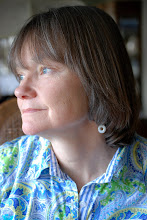Circularity
I went down to Johnson Creek yesterday to visit David, my 78 year old sheepherding and firewood cutting buddy and to watch the city pave a road into the ‘old home place’ across the used-to-be-dirt road. They’re going to take out the old WPA installed rip rap and restore the many bends that used to wind through what became a prosperous little self sufficient dairy farm for David’s immigrant parents. We walked the fields where David was born in 1928 and he pointed out which of the felled trees his mother had brought down from Canada as seedlings when they bought the land. After, David laid out album pages showing his older siblings playing in the old creek and then playing in the new riprap lined creek with its dam and little pond by the house.
When the city is done with the project it will be restored to a state much like it was when David’s father bought it. When the WPA straightened the creek and lined it with stone to create more farmland. The restoration of the bends and sloughs is to control flooding and recreate fish habitat. What goes around seems to go around, doesn’t it? I listened to a long radio feature about the ‘100 mile diet’ the other day. Ernest people were talking about the challenge of living on what had been grown within a 100 mile radius of their homes in order to minimize the carbon pricetag of their food’s transportation. What is the distance food travels to reach most plates? It’s many hundreds of miles as I recall, even thousands. That’s where we started, wasn’t it? You ate what you and your neighbors grew, bought those few precious staples like coffee, tea, maybe sugar if you didn’t have honey, but most people had access to bees. You ate seasonally, the dinner table got boring in winter.
It seemed so wonderful to be able to have a mango or a ripe tomato in February. It still is wonderful, but the wonder has kind of worn off to become expectation. And we never did really pay attention to the price tag, did we? Not of the extra farmland or the winter tomato. It’s a very different way of thinking, to consider what is available outside the door rather than what you want to have for dinner tonight or what's convenient. But it’s really not that difficult. I’ve been living like that for about twenty-five years, as a lifestyle choice that allowed me to live on what I made as a writer. I guess it was a good thing for the planet, too, although I’m hardly uber-virtuous where a carbon-neutral lifestyle is concerned. But I do my best. There’s a lot to be said for circularity, whether it’s a more natural way of slowing down the storm water or a way to reduce the gallons of diesel fuel needed to transport that ripe tomato to your table in February. Looking back doesn’t mean giving up everything you have today, but it can mean broadening your choices. A little change is not a bad thing.
When the city is done with the project it will be restored to a state much like it was when David’s father bought it. When the WPA straightened the creek and lined it with stone to create more farmland. The restoration of the bends and sloughs is to control flooding and recreate fish habitat. What goes around seems to go around, doesn’t it? I listened to a long radio feature about the ‘100 mile diet’ the other day. Ernest people were talking about the challenge of living on what had been grown within a 100 mile radius of their homes in order to minimize the carbon pricetag of their food’s transportation. What is the distance food travels to reach most plates? It’s many hundreds of miles as I recall, even thousands. That’s where we started, wasn’t it? You ate what you and your neighbors grew, bought those few precious staples like coffee, tea, maybe sugar if you didn’t have honey, but most people had access to bees. You ate seasonally, the dinner table got boring in winter.
It seemed so wonderful to be able to have a mango or a ripe tomato in February. It still is wonderful, but the wonder has kind of worn off to become expectation. And we never did really pay attention to the price tag, did we? Not of the extra farmland or the winter tomato. It’s a very different way of thinking, to consider what is available outside the door rather than what you want to have for dinner tonight or what's convenient. But it’s really not that difficult. I’ve been living like that for about twenty-five years, as a lifestyle choice that allowed me to live on what I made as a writer. I guess it was a good thing for the planet, too, although I’m hardly uber-virtuous where a carbon-neutral lifestyle is concerned. But I do my best. There’s a lot to be said for circularity, whether it’s a more natural way of slowing down the storm water or a way to reduce the gallons of diesel fuel needed to transport that ripe tomato to your table in February. Looking back doesn’t mean giving up everything you have today, but it can mean broadening your choices. A little change is not a bad thing.


0 Comments:
Post a Comment
<< Home